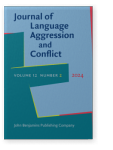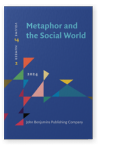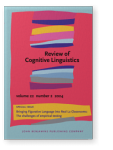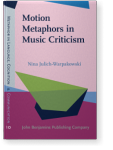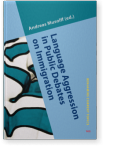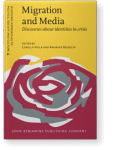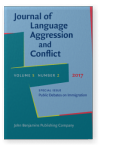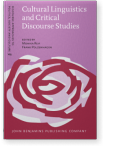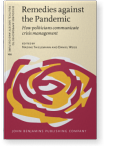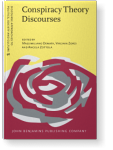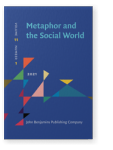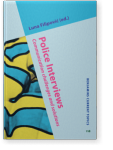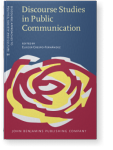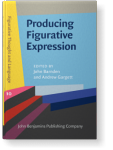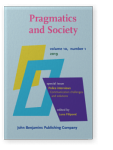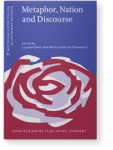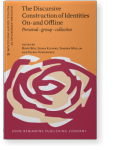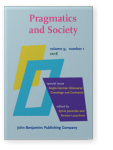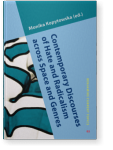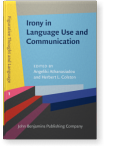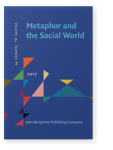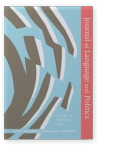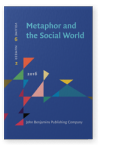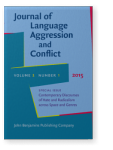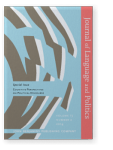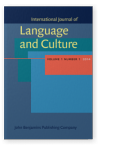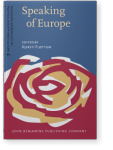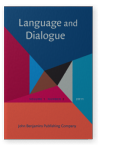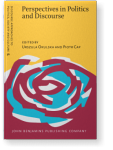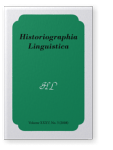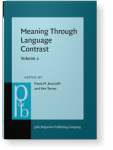Andreas Musolff
List of John Benjamins publications for which Andreas Musolff plays a role.
Journals
ISSN 2210-4070 | E-ISSN 2210-4097
ISSN 1877-9751 | E-ISSN 1877-976X
Book series
Titles
Language Aggression in Public Debates on Immigration
Edited by Andreas Musolff
[Benjamins Current Topics, 102] 2019. v, 179 pp.
Subjects Discourse studies | Pragmatics
Migration and Media: Discourses about identities in crisis
Edited by Lorella Viola and Andreas Musolff
[Discourse Approaches to Politics, Society and Culture, 81] 2019. xi, 360 pp.
Subjects Communication Studies | Discourse studies | Pragmatics
Public Debates on Immigration
Edited by Andreas Musolff
Special issue of Journal of Language Aggression and Conflict 5:2 (2017) vi, 177 pp.
Subjects Communication Studies | Discourse studies | Pragmatics
2023 Culture-specific variation in interpretations of nations as bodies metaphors by English and German L1 speakers Cultural Linguistics and Critical Discourse Studies, Reif, Monika and Frank Polzenhagen (eds.), pp. 15–35 | Chapter
One of the key-metaphor complexes in conceptualizing national identity is that of the nation as a body or a person. Nation -embodiment and -personalization have had a long conceptual history and still figure prominently in present-day political discourse. However, the socio-psychological impact… read more
2023 Trump’s framing of Covid-19 as a war and conspiracy theories Remedies against the Pandemic: How politicians communicate crisis management, Thielemann, Nadine and Daniel Weiss (eds.), pp. 256–275 | Chapter
The use of war-related metaphors by Western political leaders to frame the COVID19 pandemic has drawn strong criticism, both in the media and among critical discourse analysts. A particular reference point in such criticisms has been the long-standing critique of the illness-as war metaphor… read more
2022 Chapter 6. Fake conspiracy: Trump’s anti-Chinese ‘COVID-19-as-war’ scenario Conspiracy Theory Discourses, Demata, Massimiliano, Virginia Zorzi and Angela Zottola (eds.), pp. 121–140 | Chapter
Conspiracy theories have an extraordinarily strong persuasive effect, as their huge increase during the public debate about the COVID-19 pandemic shows. How can they achieve such a communicative impact, given their flawed epistemic status? This chapter studies one COVID-19 related conspiracy… read more
2021 “You keep telling us different things, what do we believe?”: Meta-communication and meta-representation in police interviews Police Interviews: Communication challenges and solutions, Filipović, Luna (ed.), pp. 33–49 | Chapter
Quotation and reflective interpretation of previous statements are common features in police interviews. Of particular importance is the uncovering of apparent contradictions between earlier and current responses in interviews of suspects. Conflicting statements can be used by officers as… read more
2021 Preface Discourse Studies in Public Communication, Crespo-Fernández, Eliecer (ed.), pp. vii–viii | Preface
2020 Metaphor production and metaphor interpretation Producing Figurative Expression: Theoretical, experimental and practical perspectives, Barnden, John and Andrew Gargett (eds.), pp. 85–104 | Chapter
Metaphor production and interpretation are intricately connected: the former has the latter as its ostensive target; however, interpretation processes can trigger new metaphor formulations which were unforeseen by the original speaker and would have to count as new productions. This paper looks… read more
2019 “You keep telling us different things, what do we believe?”: Meta-communication and meta-representation in police interviews Police interviews: Communication challenges and solutions, Filipović, Luna (ed.), pp. 32–48 | Article
Quotation and reflective interpretation of previous statements are common features in police interviews. Of particular importance is the uncovering of apparent contradictions between earlier and current responses in interviews of suspects. Conflicting statements can be used by officers as… read more
2019 Afterword: Nations need (new?) metaphors Metaphor, Nation and Discourse, Šarić, Ljiljana and Mateusz-Milan Stanojević (eds.), pp. 347–348 | Miscellaneous
2019 Chapter 14. “They have lived in our street for six years now and still don’t speak a work [!] of English”: Scenarios of alleged linguistic underperformance as part of anti-immigrant discourses Migration and Media: Discourses about identities in crisis, Viola, Lorella and Andreas Musolff (eds.), pp. 339–354 | Chapter
Whilst sociolinguistic superdiversity is often viewed as an almost irreversible global development, there may be a question mark over whether the ‘mix of cultures’, which mass migration allegedly fosters, does in fact lead to an acceptance of multilingualism and/or multiculturalism in the… read more
2019 Language aggression in public debates on immigration Language Aggression in Public Debates on Immigration, Musolff, Andreas (ed.), pp. 1–3 | Introduction
2019 Introduction: Migration and crisis identity Migration and Media: Discourses about identities in crisis, Viola, Lorella and Andreas Musolff (eds.), pp. 1–10 | Introduction
2018 Nations as persons: Collective identities in conflict The Discursive Construction of Identities On- and Offline: Personal - group - collective, Bös, Birte, Sonja Kleinke, Sandra Mollin and Nuria Hernández (eds.), pp. 249–266 | Chapter
The paper analyses the construal of collective identities in the Middle East conflict, with special regard to the nation-as-person metaphor. This metaphor has been highlighted by proponents of Conceptual Metaphor Theory and Critical Metaphor Analysis as being instrumental in conceptualizing… read more
2018 The afterlife of an infamous gaffe: Wilhelm II’s ‘Hun speech’ of 1900 and the anti-German Hun stereotype during World War I in British and German popular memory Anglo-German Discourse Crossings and Contrasts, Jaworska, Sylvia and Torsten Leuschner (eds.), pp. 75–90 | Article
Kaiser Wilhelm II’s speech to a German contingent of the international expedition corps, sent to quell the so-called ‘Boxer Rebellion’ in 1900, is today remembered chiefly as an example of his penchant for boastful, sabre-rattling rhetoric that included a strange comparison of his soldiers with… read more
2017 Language aggression in public debates on immigration Public Debates on Immigration, Musolff, Andreas (ed.), pp. 175–177 | Introduction
2017 Dehumanizing metaphors in UK immigrant debates in press and online media Contemporary Discourses of Hate and Radicalism across Space and Genres, Kopytowska, Monika (ed.), pp. 41–56 | Article
Some Internet genres, in particular Weblogs and discussion fora, have a dubious reputation for giving voice to strongly polemical discourses or hate-speech. This chapter investigates the use of dehumanizing metaphors, specifically parasite metaphors, in British debates about immigration. It… read more
2017 Chapter 6. Irony and sarcasm in follow-ups of metaphorical slogans Irony in Language Use and Communication, Athanasiadou, Angeliki and Herbert L. Colston (eds.), pp. 127–142 | Chapter
In public political discourse, figurative expressions used by one participant are often followed up and ‘countered’ by other participants through ironical allusions, comments and altered quotations aimed at denouncing the original version or deriving a new, contrarian conclusion from it. What is… read more
2017 Truths, lies and figurative scenarios: Metaphors at the heart of Brexit Journal of Language and Politics 16:5, pp. 641–657 | Article
This article studies one of the key-metaphors that has dominated British EU-debates for the past 25 years, i.e. the slogan, Britain at the heart of Europe. The discourse career of this metaphor up to the Brexit referendum shows a decline in its affirmative, optimistic use, and a converse… read more
2016 Cross-cultural variation in deliberate metaphor interpretation Metaphor and the Social World 6:2, pp. 205–224 | Article
The distinction between ‘deliberate’ and ‘non deliberate’ metaphors has been developed within a five-step framework (Steen) of metaphor production. Deliberate metaphors invite the addressee to pay special attention to their cross-domain structure mapping rather than focusing primarily on the… read more
2015 Dehumanizing metaphors in UK immigrant debates in press and online media Contemporary Discourses of Hate and Radicalism across Space and Genres, Kopytowska, Monika (ed.), pp. 41–56 | Article
Some Internet genres, in particular Weblogs and discussion fora, have a dubious reputation for giving voice to strongly polemical discourses or hate-speech. This paper investigates the use of dehumanizing metaphors, specifically parasite metaphors, in British debates about immigration. It compares… read more
2014 Metaphorical parasites and “parasitic” metaphors: Semantic exchanges between political and scientific vocabularies Cognitive Perspectives on Political Discourse, Fischer, Pascal and Christoph Schubert (eds.), pp. 218–233 | Article
The metaphorical categorization of social and political adversaries as “parasites” has an infamous history in public discourse: For two centuries it has been routinely used for the purpose of racial and socio-political stigmatization. In cognitive accounts, the parasite-metaphor has usually been… read more
2014 Metaphors: Sources for intercultural misunderstanding? International Journal of Language and Culture 1:1, pp. 42–59 | Article
Over the last two decades, questions of languages’ cultural specificity, diversity, and of linguistic universalism versus relativism, have increasingly been applied to the study of metaphor in analyses that take data from a wide range of languages into account. After reviewing existing research on… read more
2013 The heart of Europe: Synchronic variation and historical trajectories of a political metaphor Speaking of Europe: Approaches to complexity in European political discourse, Fløttum, Kjersti (ed.), pp. 135–150 | Article
The chapter analyses the development of the heart-of-Europe metaphor in British political discourse during the past two decades and in the wider context of conceptual history. On the basis of a corpus of media texts from 1990 to 2010, we chart the discursive career of programmatic statements by… read more
2011 Metaphor in political dialogue Language and Dialogue 1:2, pp. 191–206 | Article
Metaphor and other figurative uses of language play a central role in political dialogue on account of their semantic, pragmatic and textual ‘added value’ effects: they provide an opportunity to introduce new thematic aspects, increase the textual coherence of the dialogue contributions and provide… read more
2010 Chapter 2. Political metaphor and bodies politic Perspectives in Politics and Discourse, Okulska, Urszula and Piotr Cap (eds.), pp. 23–42 | Article
2003 Cross-language metaphors: Conceptual or pragmatic variation? Meaning Through Language Contrast: Volume 2, Jaszczolt, Katarzyna M. and Ken Turner (eds.), pp. 125–139 | Article
1999 Karl Bühler Handbook of Pragmatics: 1997 Installment, Verschueren, Jef, Jan-Ola Östman, Jan Blommaert † and Chris Bulcaen (eds.), pp. 1–15 | Article
